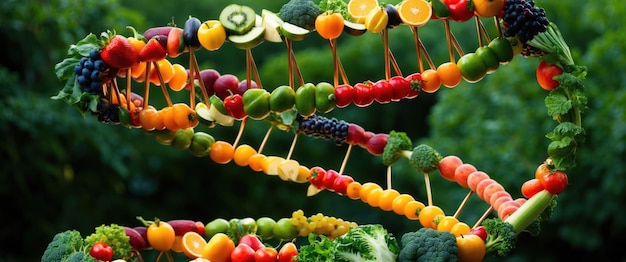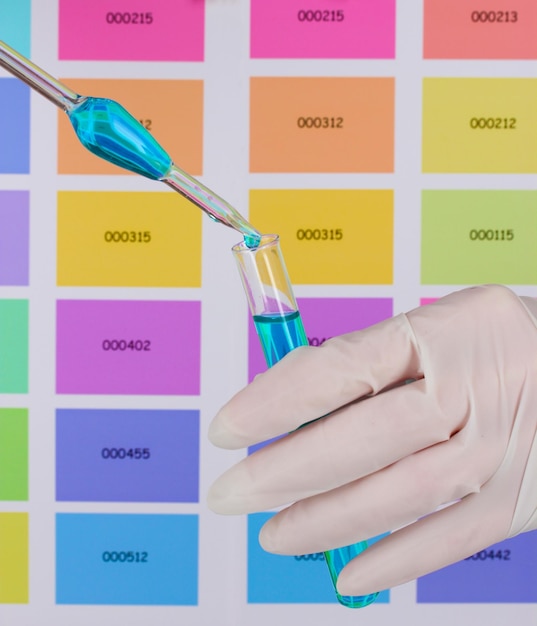Personalized Nutrition: DNA Testing & Diet Trends in the US

The Rise of Personalized Nutrition: How DNA Testing is Shaping Diets in the US involves using genetic information to create customized dietary plans, optimizing health outcomes based on individual genetic predispositions to nutrients, metabolism, and specific health conditions.
The era of one-size-fits-all diets is fading as The Rise of Personalized Nutrition: How DNA Testing is Shaping Diets in the US gains momentum. By analyzing individual genetic makeups, people are unlocking insights into how their bodies uniquely process nutrients, paving the way for tailored eating plans that optimize health and well-being.
Decoding Your Genes: The Foundation of Personalized Nutrition
Personalized nutrition, at its core, is about understanding that each person’s body operates differently. Genetic variations influence how we metabolize nutrients, respond to different foods, and our susceptibility to certain diseases. DNA testing serves as the cornerstone of this approach, offering a detailed blueprint of an individual’s genetic predispositions.
By identifying these genetic markers, personalized nutrition can help people make more informed dietary choices.
How DNA Testing Works
DNA testing for personalized nutrition is relatively straightforward. It typically involves providing a saliva sample or a cheek swab, which is then sent to a lab for analysis. The lab examines specific genes related to metabolism, nutrient absorption, and other health-related factors. Understanding how this information is gathered helps users to trust the process.
Key Genetic Markers
Certain genetic markers are particularly relevant to nutrition. For example, genes related to lactose intolerance, gluten sensitivity, and caffeine metabolism can inform dietary choices. Additionally, genes that influence the metabolism of vitamins and minerals can help individuals identify potential deficiencies and tailor their diets accordingly.

- Lactose Intolerance Gene (LCT): Helps determine the likelihood of lactose intolerance, guiding dairy consumption.
- Gluten Sensitivity Genes (HLA-DQ2/DQ8): Indicates potential sensitivity to gluten, informing decisions about wheat and gluten-containing foods.
- Caffeine Metabolism Gene (CYP1A2): Determines how quickly your body processes caffeine, influencing coffee consumption habits.
- Vitamin D Receptor Gene (VDR): Affects vitamin D absorption and utilization, helping to optimize vitamin D intake.
In conclusion, understanding the science behind DNA testing and the specific genetic markers involved is essential for appreciating the potential of personalized nutrition. This knowledge empowers individuals to make more informed decisions about their diets, leading to improved health outcomes.
The Benefits of Personalized Diets Tailored by DNA
Shifting from generic dietary guidelines to personalized diets driven by DNA analysis brings a host of potential benefits. These tailored approaches can lead to more effective weight management, improved energy levels, and a reduced risk of chronic diseases. By aligning dietary choices with individual genetic predispositions, people can optimize their health and well-being.
The impact on general nutrition is significant.
Enhanced Weight Management
One of the primary benefits of personalized diets is their potential to enhance weight management. Genetic variations can influence how people metabolize carbohydrates, fats, and proteins. By understanding these variations, personalized diets can be designed to optimize metabolism and promote weight loss or maintenance.
Improved Energy Levels
Diet plays a crucial role in energy levels. Personalized nutrition can identify specific nutrient deficiencies or imbalances that may be contributing to fatigue. By tailoring diets to address these issues, individuals can experience improved energy levels and overall vitality. Addressing the specific needs of individuals is key to their energy.

Reduced Risk of Chronic Diseases
Chronic diseases such as heart disease, type 2 diabetes, and certain cancers are often influenced by both genetic and environmental factors, including diet. Personalized nutrition can help mitigate genetic predispositions to these diseases by recommending dietary changes that reduce risk factors. These risk factors can be influenced by personalized adjustments.
- Heart Health: Tailoring fat intake based on genetic predispositions related to cholesterol metabolism.
- Type 2 Diabetes: Optimizing carbohydrate intake based on genes affecting insulin sensitivity and glucose metabolism.
- Cancer Prevention: Increasing intake of specific antioxidants and nutrients based on genetic variants associated with cancer risk.
Ultimately, the benefits of personalized diets extend beyond mere weight loss, into the realm of disease prevention. This proactive approach enables individuals to take control of their health and optimize their well-being based on their unique genetic blueprint.
Navigating the Landscape: DNA Testing Companies in the US
The market for DNA testing companies offering personalized nutrition advice has grown significantly in the US. Several companies provide comprehensive genetic analysis and tailored dietary recommendations based on individual results. Each company has its own unique approach and focus, so it’s important to understand the differences when choosing a provider. The many differences make the options broad.
Knowing your options is crucial.
Key Players in the Market
Several companies have emerged as leaders in the personalized nutrition market. These include names like 23andMe, AncestryDNA, and specialized nutrition-focused companies like Nutrigenomix and DNAFit. Each offers a different level of detail and focus on nutritional insights.
Comparing Services and Features
When comparing DNA testing companies, consider the range of genetic markers analyzed, the depth of the nutritional recommendations provided, and the overall user experience. Some companies focus on broad health insights, while others specialize in diet and fitness. Also, the price point needs to be compared.
Pros and Cons of Different Providers
Each provider comes with its own set of advantages and disadvantages. For example, 23andMe offers comprehensive health and ancestry information, but its nutritional advice may be less detailed than that from specialized companies like Nutrigenomix. Considering these pros and cons is essential for making an informed decision.
- 23andMe: Comprehensive health insights, may lack detailed nutritional advice.
- AncestryDNA: Focus on ancestry, limited nutritional information.
- Nutrigenomix: Specialized, in-depth nutritional analysis.
- DNAFit: Focus on diet and fitness, tailored recommendations.
In conclusion, choosing the right DNA testing company involves careful consideration of individual needs and preferences. By understanding the services, features, and drawbacks of each provider, consumers can make informed decisions that align with their health goals and priorities.
The Science vs. the Hype: Separating Fact from Fiction
As the rise of Personalized Nutrition: How DNA Testing is Shaping Diets in the US continues, it’s essential to distinguish between scientifically-backed claims and marketing hype. While personalized nutrition holds promise, it’s crucial to approach it with a critical eye and rely on evidence-based information. There can be misinformation, so be cautious.
Staying informed is key.
Evaluating Scientific Evidence
The scientific evidence supporting personalized nutrition is growing, but it’s not yet definitive. Some studies have shown positive outcomes, while others have been less conclusive. Evaluating the quality and rigor of scientific studies is essential for discerning fact from fiction. This is especially important because so much information is online.
Common Misconceptions
Several misconceptions surround personalized nutrition. One common myth is that a DNA test can provide a complete and foolproof dietary plan. In reality, genetics is just one factor influencing health, and lifestyle factors such as diet, exercise, and environment also play significant roles. Don’t listen to everything – do your own research.
Potential Risks and Limitations
While DNA testing is generally safe, there are potential risks and limitations to consider. Genetic information can be sensitive, and privacy concerns are paramount. Additionally, the interpretation of genetic results can be complex, and it’s important to consult with qualified healthcare professionals.
- Privacy Concerns: Protecting sensitive genetic information.
- Over-Reliance on Genetics: Balancing genetic insights with lifestyle factors.
- Interpretation Complexity: Seeking guidance from qualified healthcare professionals.
In summary, approaching personalized nutrition with a balance of optimism and critical thinking is essential. By evaluating the scientific evidence, dispelling common misconceptions, and understanding potential risks, individuals can make informed decisions that contribute to their overall health and well-being.
Integrating Personalized Nutrition into Your Life
Successfully integrating personalized nutrition into your daily life requires a strategic approach that combines genetic insights with practical dietary changes. This includes working with healthcare professionals, setting realistic goals, and making sustainable lifestyle modifications. Consider starting slow when getting started.
Small steps can lead to big changes.
Working with Healthcare Professionals
Consulting with registered dietitians, nutritionists, or genetic counselors is crucial for interpreting DNA test results and developing personalized dietary plans. These professionals can provide expert guidance and help individuals make informed decisions based on their unique genetic profiles. Get their expert opinion.
Setting Realistic Goals
Setting achievable and realistic goals is essential for long-term success. Instead of aiming for drastic changes overnight, focus on making gradual dietary modifications that align with your genetic predispositions and lifestyle. A long-term goal is easier than a rapid short-term goal.
Making Sustainable Lifestyle Modifications
Personalized nutrition is not a quick fix but rather a long-term approach to health and well-being. It involves making sustainable lifestyle modifications that can be maintained over time. This includes choosing nutrient-dense foods, practicing mindful eating, and incorporating regular physical activity into your routine.
- Nutrient-Dense Foods: Prioritizing whole, unprocessed foods.
- Mindful Eating: Paying attention to hunger and fullness cues.
- Regular Physical Activity: Incorporating exercise into your daily routine.
In conclusion, integrating personalized nutrition into your life requires a holistic approach that combines genetic insights with expert guidance, realistic goals, and sustainable lifestyle changes. By embracing this approach, individuals can unlock the full potential of personalized nutrition and achieve lasting improvements in their health and well-being.
The Future of Diet: Personalized Nutrition’s Evolution
The Rise of Personalized Nutrition: How DNA Testing is Shaping Diets in the US represents just the beginning of a broader movement toward individualized healthcare. As technology advances and our understanding of genetics deepens, personalized nutrition is poised to become even more precise and accessible, transforming how we approach diet and health. This trend will continue to grow.
The future is bright.
Advancements in Technology
Technological advancements are driving the evolution of personalized nutrition. Improved DNA sequencing technologies are making genetic testing more affordable and accessible. Additionally, wearable devices and mobile apps are providing real-time data on metabolic responses to food, enabling more precise dietary adjustments.
Potential Challenges and Ethical Considerations
As personalized nutrition becomes more prevalent, it’s important to address potential challenges and ethical considerations. These include ensuring data privacy, preventing genetic discrimination, and addressing health disparities in access to personalized nutrition services. These issues are important to consider.
Predictions for the Next Decade
In the next decade, personalized nutrition is likely to become more integrated into mainstream healthcare. Healthcare providers may routinely incorporate genetic testing into patient assessments, and personalized dietary plans may become a standard part of preventive care. This could be the new standard.
- Integration into Healthcare: Routine genetic testing and personalized dietary plans.
- Data Privacy: Ensuring the security and confidentiality of genetic information.
- Accessibility: Addressing health disparities in access to personalized nutrition services.
In conclusion, the future of personalized nutrition is bright, with technological advancements and a growing understanding of genetics paving the way for more precise and accessible dietary recommendations. By addressing potential challenges and ethical considerations, we can ensure that personalized nutrition benefits all individuals and contributes to a healthier future.
| Key Point | Brief Description |
|---|---|
| 🧬 DNA Testing | Unlocks genetic predispositions for tailored dietary plans. |
| 🍎 Benefits | Enhanced weight management and overall health improvements. |
| 🔬 Science vs. Hype | Critical evaluation of evidence is essential. |
| 🤝 Integration | Healthcare professionals offer expertise in dietary adjustments. |
Frequently Asked Questions
▼
Personalized nutrition involves tailoring dietary recommendations based on an individual’s unique genetic makeup, lifestyle, and health goals. It uses genetic testing to understand how different people process nutrients differently.
▼
DNA testing identifies genetic variations that influence nutrient metabolism, food sensitivities, and disease risk. This information is used to create dietary plans that optimize health outcomes for individuals.
▼
The scientific evidence supporting personalized nutrition is growing, but more research is needed. While it shows promise, it’s essential to seek guidance from healthcare professionals for accurate interpretation and advice.
▼
Yes, DNA testing raises privacy concerns. It’s crucial to choose reputable companies that prioritize data security and confidentiality. Additionally, be aware of potential genetic discrimination risks. Make sure to do your due diligence before selecting a testing provider.
▼
Start by consulting with a healthcare professional or registered dietitian who can interpret your DNA test results and develop a personalized dietary plan. Set realistic goals, and focus on sustainable lifestyle changes – this approach takes time and dedication.
Conclusion
In conclusion, the rise of Personalized Nutrition: How DNA Testing is Shaping Diets in the US is transforming the way we approach health and wellness. By leveraging genetic insights, individuals can make more informed dietary choices to optimize their health, enhance weight management, and reduce the risk of chronic diseases. As technology advances, personalized nutrition has the potential to become even more precise and accessible, paving the way for a healthier future.
